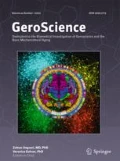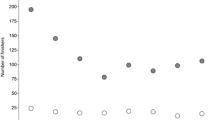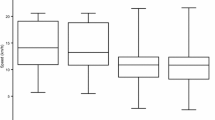Abstract
In the last decades, the participation of elderly trained people in endurance events such as marathon running has dramatically increased. Previous studies suggested that the performance of master runners (>40 years) during marathon running has improved. The aims of the study were (1) to analyze the changes in participation and performance trends of master marathon runners between 1980 and 2009, and (2) to compare the gender differences in performance as a function of age across the years. Running times of the best male and female runners between 20 and 79 years of age who competed in the New York City Marathon were analyzed. Gender differences in performance times were analyzed for the top 10 male and female runners between 20 and 65 years of age. The participation of master runners increased during the 1980–2009 period, to a greater extent for females compared to males. During that period, running times of master runners significantly (P < 0.01) decreased for males older than 64 years and for females older than 44 years, respectively. Gender differences in running times decreased over the last three decades but remained relatively stable across the ages during the last decade. These data suggest that male (≥65 years) and female (≥45 years) master runners have probably not yet reached their limits in marathon performance. The relative stability of gender differences in marathon running times across the different age groups over the last decade also suggests that age-related declines in physiological function do not differ between male and female marathoners.



Similar content being viewed by others
References
Baker AB, Tang YQ (2010) Aging performance for masters records in athletics, swimming, rowing, cycling, triathlon, and weightlifting. Exp Aging Res 36:453–477
Burfoot A (2007) The history of the marathon. Sports Med 37:284–287
Faulkner JA, Davis CS, Mendias CL, Brooks SV (2008) The aging of elite male athletes: age-related changes in performance and skeletal muscle structure and function. Clin J Sport Med 18:501–507
Harper S, Howse K (2008) An upper limit to human longevity? Popul Ageing 1:99–106
Hawkins SA, Wiswell RA, Marcell TJ (2003) Exercise and the master athlete—a model of successful aging? J Gerontol Med Sci 58A:1009–1111
Holloszy JO, Kohrt WM (1995) Exercise. In: Masoro EJ (ed) Handbook of physiology: aging. Oxford University Press, Oxford, pp 633–666
Hunter SK, Stevens AA, Magennis K, Skelton KW, Fauth M (2011) Is there a sex difference in the age of elite marathon runners? Med Sci Sports Exerc 43:656–664
Jokl P, Sethi PM, Cooper AJ (2004) Masters’s performance in the New York City marathon 1983–1999. Br J Sports Med 38:408–412
Joyner MJ, Ruiz JR, Lucia A (2011) The two-hour marathon: who and when? J Appl Physiol 110:275–277
Knechtle B, Wirth A, Knechtle P, Zimmermann K, Kohler G (2009) Personal best marathon performance is associated with performance in a 24-h run and not anthropometry or training volume. Br J Sports Med 43:836–839
Knobloch K, Yoon U, Vogt PM (2008) Acute and overuse injuries correlated to hours of training in master running athletes. Foot Ankle Int 29:671–676
Lee MS, Tanaka K (1997) Significance of health fitness appraisal in an aging society. Appl Hum Sci 16:123–131
Lepers R (2008) Analysis of Hawaii ironman performances in elite triathletes from 1981 to 2007. Med Sci Sports Exerc 40:1828–1834
Lepers R, Maffiuletti N (2011) Age and gender interactions in ultra-endurance performance: insight from triathlon. Med Sci Sports Exerc 43:134–139
Leyk D, Erley O, Ridder D, Leurs M, Rüther T, Wunderlich M, Sievert A, Baum K, Essfeld D (2007) Age-related changes in marathon and half-marathon performances. Int J Sports Med 28:513–517
Leyk D, Erley O, Gorges W, Ridder D, Rüther T, Wunderlich M, Sievert A, Essfeld D, Piekarski C, Erren T (2009) Performance, training and lifestyle parameters of marathon runners aged 20–80 years: results of the PACE-study. Int J Sports Med 30:360–365
Pate RR, O’Neil JR (2007) American women in the marathon. Sport Med 37:294–298
Phillips SK, Rook KM, Siddle NC, Bruce SA, Woledge RC (1993) Muscle weakness in women occurs at an earlier age than in men, but strength is preserved by hormone replacement therapy. Clin Sci (Lond) 84:95–98
Ransdell LB, Vener J, Huberty J (2009) Masters athletes: an analysis of running, swimming, cycling performance by age and gender. J Exerc Sci Fit 7:61–73
Samson MM, Meeuwsen IB, Crowe A, Dessens JA, Duursma SA, Verhaar HJ (2000) Relationships between physical performance measures, age, height and body weight in healthy adults. Age Ageing 29:235–242
Sparkling PB, O’Donnell EM, Snow TK (1998) The gender difference in distance running performance has plateaued: an analysis of world rankings from 1980 to 1996. Med Sci Sports Exerc 30:1725–1729
Tanaka H, Seals DR (2003) Invited review: dynamic exercise performance in masters athletes: insight into effects of primary human aging on physiological functional capacity. J Appl Physiol 95:2152–2162
Tanaka H, Seals DR (2008) Endurance exercise performance in masters athletes: age-associated changes and underlying physiological mechanisms. J Physiol 586:55–63
Trappe S (2007) Marathon runners. How do they age? Sports Med 37:302–305
Vihma T (2010) Effects of weather on the performance of marathon runners. Int J Biometeorol 54:297–306
Williams PT (1997) Relationship of distance run per week to coronary heart disease risk factors in 8283 male runners. The National Runners' Health Study. Arch Intern Med 157:191–198
Williams PT (2009a) Incident hypercholesterolemia in relation to changes in vigorous physical activity. Med Sci Sports Exerc 41:74–80
Williams PT (2009b) Lower prevalence of hypertension, hypercholesterolemia, and diabetes in marathoners. Med Sci Sports Exerc 41:523–529
Acknowledgments
The authors would like to extend their gratitude to Paul Stapley (McGill University, Montreal, Canada) for helpful suggestions concerning the manuscript.
Author information
Authors and Affiliations
Corresponding author
About this article
Cite this article
Lepers, R., Cattagni, T. Do older athletes reach limits in their performance during marathon running?. AGE 34, 773–781 (2012). https://doi.org/10.1007/s11357-011-9271-z
Received:
Accepted:
Published:
Issue Date:
DOI: https://doi.org/10.1007/s11357-011-9271-z




